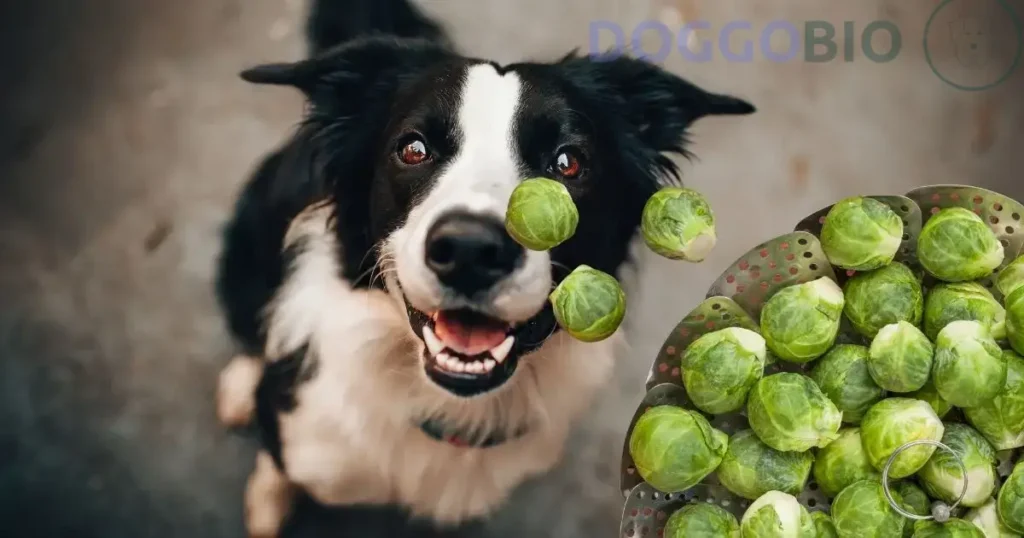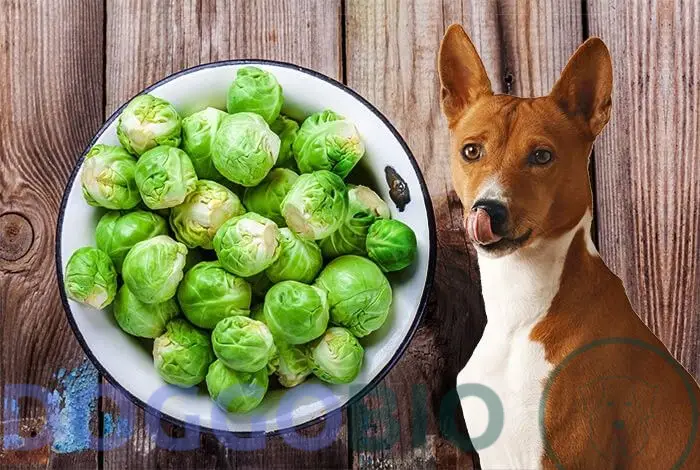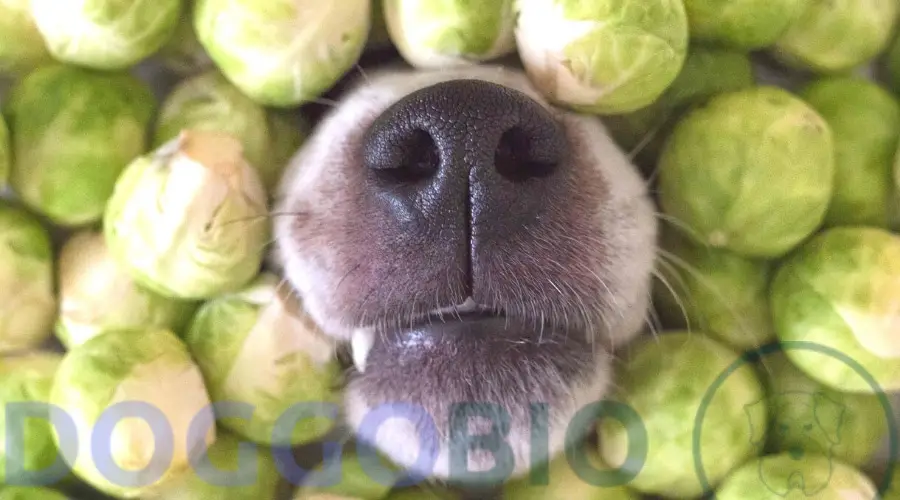“Can Dogs Eat Brussels Sprouts? It’s a common question that many dog owners ponder when considering whether to share their favorite vegetable with their furry companions. The answer, in short, is yes, dogs can eat Brussels sprouts, but there are important considerations to keep in mind to ensure your pet’s safety and well-being.
In this article, we will explore the nutritional benefits and potential risks associated with feeding Brussels sprouts to dogs and provide guidelines on safely incorporating this cruciferous vegetable into your dog’s diet.
So, let’s dive into the world of Brussels sprouts and dogs to help you make informed decisions about your pet’s nutrition.”
Can Dogs Eat Brussels Sprouts?
Yes, dogs can safely consume Brussels sprouts in moderation.
These vegetables are part of the cruciferous family, which includes kale and cabbage, and are known for their high nutritional value.
Brussels sprouts are rich in dietary fiber, vitamins, and minerals, making them a healthy supplement to a dog’s diet. However, it’s essential to serve them properly to avoid digestive issues.
The Nutritional Value Of Raw Brussels Sprouts
Before we dive into whether or not dogs can eat raw Brussels sprouts, let’s first look at the nutritional value of these vegetables.
Brussels sprouts are a member of the cruciferous vegetable family, which includes other nutrient-dense foods like broccoli, cauliflower, and kale. They are low in calories but high in fiber, vitamins, and minerals.
Here is a breakdown of the nutrients found in one cup (88 grams) of raw Brussels sprouts:
- Calories: 38
- Carbohydrates: 8 grams
- Fiber: 3 grams
- Protein: 3 grams
- Vitamin C: 124% of the recommended daily intake (RDI)
- Vitamin K: 137% of the RDI
- Folate: 12% of the RDI
- Potassium: 9% of the RDI
- Manganese: 9% of the RDI
As you can see, Brussels sprouts are a nutrient powerhouse packed with essential vitamins and minerals. But does this mean they are safe for dogs to eat?
The Risks of Feeding Raw Brussels Sprouts to Dogs
While Brussels sprouts are generally considered safe for human consumption, some potential risks are associated with feeding them to dogs. Here are some things to consider before giving your dog raw Brussels sprouts:

Digestive Issues
Brussels sprouts contain a compound called raffinose, which can be difficult for dogs to digest. This can lead to gas, bloating, and discomfort in some dogs.
Additionally, the high fiber content of Brussels sprouts can cause loose stools or diarrhea if consumed in large quantities.
Choking Hazard
Raw Brussels sprouts are small and round, making them a potential choking hazard for dogs, significantly smaller breeds.
If your dog tends to gulp down their food without chewing, it’s best to avoid giving them raw Brussels sprouts.
Thyroid Issues
Cruciferous vegetables like Brussels sprouts contain compounds called goitrogens, which can interfere with thyroid function in some dogs.
While this is not a concern for most healthy dogs, those with pre-existing thyroid issues may need to avoid consuming these vegetables.
The Benefits of Feeding Raw Brussels Sprouts to Dogs
Despite the potential risks, there are also some benefits to feeding raw Brussels sprouts to dogs. Here are a few reasons why you may want to consider adding these vegetables to your dog’s diet:

Nutrient Boost
As mentioned earlier, Brussels sprouts are packed with essential vitamins and minerals that can benefit your dog’s overall health.
Adding a small amount of raw Brussels sprouts to your dog’s diet can provide a nutrient boost and help support their immune system, digestion, and more.
Weight Management
Brussels sprouts can be a great addition to their diet if your dog needs to lose or maintain a healthy weight. These vegetables are low in calories but high in fiber, which can help your dog feel full and satisfied without consuming excess calories.
Dental Health
Chewing on raw Brussels sprouts can help keep your dog’s teeth clean and healthy. The fibrous texture of these vegetables can help remove plaque and tartar buildup, promoting good dental hygiene in your furry friend.
How To Safely Feed Raw Brussels Sprouts To Dogs?
If you give your dog raw Brussels sprouts, it’s essential to do so safely. Here are some tips to keep in mind:

Introduce Them Slowly
As with any new food, slowly introducing raw Brussels sprouts to your dog’s diet is best. Start with a small amount and monitor their reaction before gradually increasing the serving size.
Wash Thoroughly
Before feeding Brussels sprouts to your dog, make sure to wash them thoroughly to remove any dirt or pesticides that may be present on the surface.
Cut into Small Pieces
Cut the Brussels sprouts into small, bite-sized pieces to reduce the risk of choking before giving them to your dog.
Cooked vs. Raw
While this article is focused on raw Brussels sprouts, it’s worth mentioning that cooked Brussels sprouts are generally considered safer for dogs to consume. Cooking these vegetables can help break down the raffinose and make them easier to digest.
When Can We Discontinue The Use Of Brussels Sprouts?
You must monitor your dog’s reaction to Brussels sprouts and discontinue their use if you notice any adverse effects.
While these vegetables are generally safe and healthy for dogs, they can cause gas and bloating due to their high fiber content and isothiocyanates. If your dog shows signs of gastrointestinal discomfort, excessive gas, or changes in bowel movements, it’s best to stop feeding them Brussels sprouts and consult your veterinarian.
Some Posts You Wanna See More
- Can Dogs Eat Black Eyed Peas?
- Can Dogs Eat Beets?
- Can Dogs Eat Bitter Melon?
- Can Dogs Eat Bean Sprouts?
- Can Dogs Eat Banana Peppers?
- Can Dogs Eat Artichokes?
- Can Dogs Eat Amaranth?
Frequently Asked Questions
Can Dogs Eat Cooked Brussels Sprouts?
Yes, cooked Brussels sprouts are generally considered safe for dogs to eat. However, as with any new food, it’s best to introduce them slowly and in small amounts to avoid digestive issues.
Are There Any Health Benefits To Feeding Brussels Sprouts To Dogs?
Yes, Brussels sprouts are packed with essential vitamins and minerals that can benefit your dog’s overall health. They can also aid in weight management and promote good dental hygiene.
Can Dogs Eat Frozen Brussels Sprouts?
While frozen Brussels sprouts are not toxic to dogs, they may not be as nutritious as fresh ones. Additionally, frozen Brussels sprouts may pose a choking hazard if given to dogs in whole form.
How Many Brussels Sprouts Can I Give My Dog?
The amount of Brussels sprouts to feed your dog depends on their size. Small dogs can have about one sprout, while larger dogs may have up to five. It’s advisable to start with a quarter to half a shoot and watch for any signs of discomfort or gas.
It is recommended to adhere to the 90/10 rule, where 90% of your dog’s calories come from their regular food and 10% from treats like Brussels sprouts.
Are There Any Dogs That Should Not Eat Brussels Sprouts?
Dogs with pre-existing thyroid issues may need to avoid consuming Brussels sprouts due to their goitrogen content.
Additionally, if your dog has a sensitive stomach, it’s best to consult your veterinarian before adding new foods to their diet.
Can Dogs Eat Raw Brussels Sprouts?
No, Feeding raw Brussels sprouts to dogs is not recommended.
Raw sprouts can be challenging to chew and digest, which might lead to gastrointestinal issues. For smaller breeds, there’s also a risk of choking. Cooking Brussels sprouts makes them softer and more accessible to digest, reducing the risk of digestive problems.
Can Dogs Eat Brussels Sprout Stalks?
The stalks of Brussels sprouts can be challenging and fibrous, posing a choking hazard, especially for smaller dogs.
If you choose to feed your dog the stalks, it’s essential to peel off the tough outer layer and cook them to soften. This makes them safer and more digestible for your dog.
Can Dogs Eat Brussels Sprout Leaves?
Brussels sprout leaves are safe for dogs to eat when chopping and cooking. The cooking process softens the leaves, making them easier for dogs to chew and digest. As with the sprouts, serving the leaves plain is essential, without adding seasonings or oils.
Do Brussels Sprouts Make Dogs Fart?
Yes, Brussels sprouts can cause flatulence in dogs. This is due to the presence of isothiocyanates, which aid in digestion but can also produce gas. While this is a natural process and not harmful to dogs, it can be unpleasant for pet owners.
What Vegetables Are Bad For Dogs?
Certain vegetables should be avoided in a dog’s diet, including onions, garlic, and unripe tomatoes. These can be toxic to dogs and cause various health issues.
It’s best to stick to dog-safe vegetables and consult with your veterinarian if you need clarification on introducing a new vegetable to your dog’s diet.
Conclusion
In conclusion, regarding the question “Can Dogs Eat Brussels Sprouts?” the answer is yes, but with caution. While these veggies can be a healthy addition to your dog’s diet, it’s essential to introduce them carefully, watch for any adverse reactions, and consult your vet if you have concerns. Moderation is necessary, and Brussels sprouts should complement, not replace your dog’s regular food. You can offer your furry friend a tasty and nutritious treat with proper care and attention.
